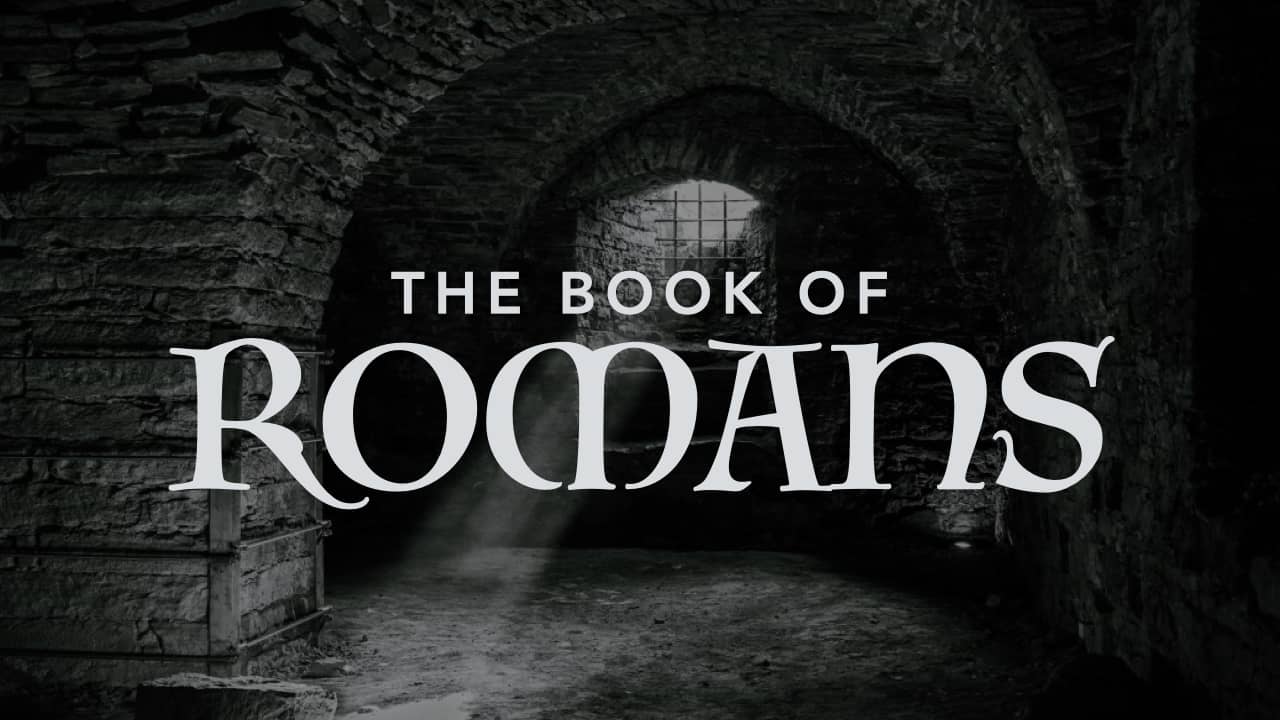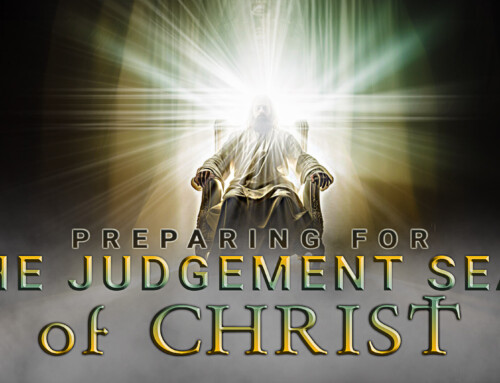THE BOOK OF ROMANS CHAPTER 4:1-13
GOD BEGINS TO RE-ESTABLISH THE LOST PART OF HIS KINGDOM… AND THAT, THROUGH ABRAHAM
First, as we have noted before, the initial purpose of Paul’s Letter to all the beloved of God, called (to be) saints at Rome, is that he intends to settle disputes among the New Man converts (Ephesians 2); those believing Jews and Gentiles, by putting them all on the same spiritual ground. He starts off in the first three chapters by explaining how both were slaves of sin. Sin being that nature innate and ineradicable in all man-kind, regardless whether they were Gentile outside the Law of Moses or Jews under the Law. Both groups Paul declares irreconcilably ungodly and unrighteous; hopelessly condemned under the Just Wrath of God’s Righteousness. And therefore, they were equally in vital need of Justification unto right standing with God. And that could only be through the imputed righteousness of the sinless substitutionary death and resurrection of Jesus the Christ. He being set forth by God as the propitiation for sin and administrated in the power of His grace to all; Jew or Gentile. All who will see themselves completely inadequate in the light of God’s Righteousness and justly deserving of Wrath will confess their great need of His gracious justification unto righteousness by believing on Christ’s propitiation offering. (When our insufficiency collides with His all-sufficiency, it leaves a vacuum/a void that only faith can fill.)
The result of Christ’s offering is God moving from His position of forbearance; unable to forgive the sin of sinners (due to His righteous Justice needing to be satisfied) to that of a place where He might be just to forgive sinners for their sin. And thereby through Christ, He now calls all men to accountability according to the freely offered justification from their sin. (Acts 17:31) This justification unto right-standing with God without works is the sole foundational doctrinal subject presented so far as the Gospel of God in the first three chapters. (In this initial Justification, righteousness is imputed, but man is not restored/reconciled to the same degree of intimacy as in the deeper level of Justification. This is seen in the example of Adam and Eve in the Garden.)
Now it is to be seen that Romans Chapter 4 is an advance of God’s Gospel on previous chapters dealing with justification and righteousness imputed without works. This righteousness is solely in the merit and power of the Blood and the Cross of Christ, the Son of Man. Paul now begins to picture Abraham as the further example of Justification by faith without works, but in addition he then introduces Jesus Christ’s Resurrection power as the Son of God and Great High Priest unto our further justification in righteousness by works. (Abraham is an example of first being justified by faith alone and then his going from faith to faith is an example of works AFTER justification.)
The doctrinal truths brought forth here in the 4th Chapter of Romans can only be clearly understood by having a good familiarity with God’s dealings with Abraham in Genesis chapters 15 and 17.
It is there we discover the promise to Abraham of 2 seeds; that seed of the physical (verse13) and that of the Seed of the spiritual; Jesus the Christ (verse 18).
Abraham’s 2 Covenants are seen, one in chapter 15, the covenant of grace, and the covenant of ‘Law’ in chapter 17.
Abraham’s 2 justifications are seen, one by faith without works in 15:5 and one by works in 17:22-27 and 22:16-18.
Abraham’s 2 eternal inheritances are seen, one by the physical seed, being the earthly realm; and one by the spiritual Seed, being the heavenly realm. (Genesis 15:5 referring to the heavenly inheritance, and verses 7 & 16 referring to the earthly inheritance.)
Also the 2 signs and seals of righteousness are seen, one in circumcision, which was given to Abraham and one being baptism, which was to the Gospel New Man and was the seal of the Holy Spirit.
And two pictures of the resurrection are shown in Abraham’s and Sarah’s bodies, and also in the fulfillment of the Covenant of Grace which God intended to fulfill thousands of years later, which demands there be the resurrection of Abraham and his faithful Seed/seed from among the dead.
(It should be here noted the corresponding essential truth, for clear understanding going forth, that what has not yet been differentiated by Paul, but only now hinted, is the distinguishing between sin from the sin nature. The justification that is set forth so far in the Book of Romans is from that sin in the ‘flesh’. This inherited sin being innate, imputed outside personal moral behavior, being solely the result of being born as the seed of Adam. This is one thing, but ongoing sin, manifest through the ‘flesh’ by the will is another. Paul’s intent, starting in chapter 4, and climaxing in chapter 8, is to separate justification from sin from justification from the sin nature. This should be in the back of our minds as we go through this book.
So within these 2 spiritual boundaries, God sets forth an example, preliminarily in Abraham, for the 2 parts of Christ’s Atonement that have to do with His seed, (Jews and the New Man) who are called first to justification with the gift of eternal life (out of that which was innate and had nothing to do with their wills) to a glorious eternal reward of inheritance (to which Abraham looked), now weighted heavily on their wills. This answers two His 2 ‘graces’ of Christ’s propitiation (minor and major grace) manifest in 2 justifications, and 2 righteousnesses.
ROMANS 4:1 “WHAT shall we say then that Abraham our father, as pertaining to the flesh (this having a Jew under law in view), hath found (by way of his circumcision)?” The answer to the question is implied…. “nothing at all”.
Verse 2 “For if Abraham were justified by works, he hath whereof to glory; but not before God…” (Romans 3:27) For if it was before men and by good works, he surely could boast, but before God he was condemned to death as the seed of Adam under the death penalty of sin.
Now Paul has shown us in Chapter 1 and now with Abraham (who, according to Joshua 24:2, was from a family of heathen idol worshippers) that Justifying faith discovered in the lost heathen is a result of God’s Spirit brooding over the lost World; stamped in creation with the testimony of a Creator, all men are endowed with an intuitive hearing. It is implied that some hear and heed this declaration of right and wrong. (Abram would not have been asked to come out of Ur had he not been leaning his spiritual ear God-ward.) This encounter with the Spirit resulted in a faith in God being expressed by more or less heartfelt corresponding right works. (Romans 2:14-15) That declaration of right and wrong is stamped upon all His Creation and thereby all are capable of receiving the merciful persuading Word of God upon the conscience. But those good responses, no matter how many or how great, would never in themselves justify them before God’s Just and very strict Righteousness of zero tolerance with sin. And therefore in His Righteousness, He declared the sentence of Eternal Wrath upon all sinners. So all, being thereby bound to sin inherently, are without escape. It is this aroused faith in Him that moves God to justifying a man, far short of His Righteousness, outside of his works, and in the first place answers to His declaring these just (without works) shall live (eternally by gracious gift) by faith (expressed in hearing and believing who He is, or in what He promises to do in the contriteness of his heart only).
It was no different with Abram/Abraham. Although his many deeds would warrant boasting before man, weighed before God’s Righteousness and Justness he yet stood eternally condemned. But it is the heart that kicks against the pricks of satan through that perception of God seen in His Creation that finds special warrant with God. But Abraham’s or any other man’s works could never make them justified unto righteousness/right-standing before God, as sin is inherent in all men and satan is their un-chosen master. (Note: It is unnecessary for the heathen to know this process in order that he might be justified before God).
It is the position of the self-righteous that they are justified by their works. (Here being aimed at the Jew but it differs not with Gentile. Many in the church are this way too.) And therein the words of Jonah are applicable that they follow lying vanities and thereby they forsake their own mercy. In that the self-righteous always judge others for what they themselves do, and thereby justly bring condemnation upon themselves. (Many Christians are losing their inheritance because they believe lying vanities. Vanities are things that appeal to you, such as the lie of having no need of a further justification/sanctification to obtain a better inheritance.)
VERSE 3 “For what saith Scripture? (about justification with imputed righteousness without works) Paul now moves to prove his point by pointing to Genesis Chapters 15 & 17…“Abraham believed God, and it was imputed to him unto righteousness.” [Genesis 15:6] Now under the Law and the Righteousness of God, it is clearly declared “there is none righteous, no, not one.” But this righteousness is not by the declaration of the Law unto God’s Righteousness, for this righteousness was imputed to Abraham even before the Covenant Law of chapter 17 (of circumcision) was given. And the righteousness was not attained through the doing of any works, but the declaration of righteousness was imputed unto Abraham by believing in the promise of seed by God’s promise. (Genesis 15:5-6)
VERSES 4-5 continue to speak to the first justification. Abram, being compared to men, was fit enough, but being compared to God’s Righteousness he is found to be ungodly. And it was Abram’s expressed believing in what God told him He would do that was accounted unto him. For justifying it is equal to obtaining God’s declaration of it.
VERSE 6 Paul brings forth David as another example of this justification unto a declared righteousness outside the Law after it was given and received by the Jews. David being a perfect example of that, in that his crime was heinous although he was well acquainted with the Law. While Abram was an example of a believer in God’s Word being an ungodly ‘Gentile’ without the Law, condemned by the Righteousness of God. Paul now brings forth David under the Law who then as a murderer and adulterer stands condemned. By and by, having his sin exposed to him by God and being broken and contrite, the prophet then declares God’s Word… “The Lord also hath put way thy sin; thou shalt not die.” (2nd Samuel 12:13) David discovers the blessedness of the man, unto whom God imputeth righteousness without works (of the Law)….
VERSE 7 Saying, “Blessed are they whose iniquities are forgiven, and whose sins are covered. Blessed is the man to whom the Lord will not impute sin”
VERSE 8 speaks to a FUTURE 2nd Justification… “Blessed is the man to whom the Lord will not (future tense) impute sin.” (Psalm 32:1-2) Thus begins here the revelation of the second justification, which is yet future. Paul speaks to a justification by works (works in service to God). What is in view is Christ’s Second Coming and that which is determined before His Judgment Seat. “Blessed and holy is he that hath part in the First Resurrection.”
To be found worthy is not to be found infallible or without taint of death but by works of faith in obedience to Jesus while alive answers to His personal judgment of our lives after having received the first justification wherein works could play no part. Now our further justification and imputation of sins hinges on works of loving service after the first justification. These are those works which He only may gauge as worthy or not of the first resurrection.
The doctrine of two Justifications… There is the past and present justification by faith alone without works solely by faith in what Christ has done; and a future justification by expressed works by faith in Jesus. The first justification being imputed by faith in Jesus Christ’s righteousness as revealed in the Blood and the Cross with the Father’s gift of eternal life. The second justification is yet future, being worked out in us through the power associated with His Resurrection. That is, in living in the power of the newness of life, (to be built upon the foundation of the first justification) which is unto sanctification (the superstructure described in 1st Corinthians 3:11-16); the conforming to Christ’s image by continuing works of righteousness unto Kingdom inheritance promised to the heavenly seed of Abraham. (Romans 8:29)
Abraham’s first justification came in his answer to what God promised without works. His (our) justification was also the beginning of his (our) sanctification. His second justification unto a further righteousness was according to works and was the result of faith in God expressed in the willing offering of Isaac (Genesis 22). In that he believed God could raise him up from the dead. (Hebrews 11) Our father of faith then answers to our first justification by faith and his example answers to our 2nd justification by works. (1st Peter 1:7… “That the trial of your faith, being much more precious than gold that perisheth, though it be tried with fire, might be found unto praise and honour and glory at the appearing of Jesus Christ.”)
It is here that Paul’s teaching on a past and present justification meets with James future justification. (See James 2:17-26)
”The righteous by faith shall live.” This same spiritual law that describes the event of the justification by faith unto the gift of living eternally without works, also describes the process of sanctification unto justification by faith unto glory, in that “by faith the righteous shall live.”
Verse 9 “Cometh this blessedness then upon the circumcision only or upon the uncircumcision also?
VERSE 10 “…not in circumcision but in uncircumcision.” So it is that this blessedness is for both Jew and Gentile.
VERSE 11 “And he received the sign of circumcision…” (Genesis 17) To what does circumcision speak? It was a sign from God in the assurance of His Word of Promise. It was the testimony to others (Gentiles) of Abraham’s justification by faith and righteousness before the One God without works, being before circumcision. And it speaks of the promise of Abraham’s miraculous seed in that one son Isaac, being the line of the Messiah, circumcision being typically pictured by the 8th day, that which speaks of the first day of the week, the day after the Sabbath, wherein the Messiah was brought up from among the dead in confirmation of His being the prophesied Righteous One before God. It was the dawning of new beginnings, representative of the new creative work He would perform, that of the new man in the circumcision of his heart.
Additionally, it was a seal that testified to God’s ownership of him, having been imputed righteousness, while at the same time discovered unto him more clearly that there was yet evil within him that he must put away. (This can be perceived in the admonition after the affair with Hagar, in that God declares Himself El Shaddai in Genesis 16. And as Hagar and Ishmael represent the flesh and the law as opposed to spirit, they are to be put out, as they have no inheritance with the son of the spirit. Genesis 21:10, Galatians 4:21-31). This flesh Paul recognized in himself, as he will declare in the 7th chapter, and as he would to the Corinthians… “I keep under my body, and bring it into subjection: lest that by any means, when I have preached to others, I myself should be a castaway.’ (1st Corinthians 9:27)
The rite of circumcision in the Gospel has changed as the Messiah has come and filled up the meaning of all righteousness. It was at Pentecost that the Gospel was then to be inclusive to Gentiles. Peter quoted the prophet Joel in that regard. “The promise is to you (Jews) and to your children, and to all that are afar off (Gentiles). God set them both on the same foundation. Now the Gospel word Peter preached was followed by the command to those who believed. “Repent, and be baptized in the name of Jesus Christ for the remission of sins, and ye shall receive the gift of the Holy Ghost.”
Baptism; the immersion in water is the sign of God’s ownership in the Gospel, and the seal that of the Holy Spirit. The rite of circumcision, the sign and seal of Abraham’s faith that he had before he was circumcised becomes law to Abraham’s seed. And here the 2 seeds of Abraham manifest; those of the flesh who seek a righteousness by keeping the law, and those like Abraham whose righteousness is by the spirit through faith.
VERSE 12 “And the father of circumcision to them who are not of the circumcision only, but who also walk in the steps of that faith of our father Abraham, which he had being yet uncircumcised.” Paul is declaring that the way of salvation (justification plus sanctification) by faith is open to both Jew and Gentile. The example is in Abraham’s justification and in the way he walked afterwards in the spirit before and after circumcision. So here Paul goes beyond justification and begins to deal with the walk after justification by faith. Abraham is set as a pattern now for the obedience of faith in both Jew and Gentile. To walk in the steps of Gospel faith, as the spiritual seed of Abraham, is to believe, repent, then surrender the body to be buried in baptism; and rise in the faith of the resurrection power of the newness of life in obedience in and to Christ unto the circumcision of the heart, in the living a life in body and soul worthy of the first resurrection. Without this circumcision of the flesh from the heart, the merely justified will be cut off from His people in the inheritance of the heavenly kingdom promise. (Genesis 17:14) This reflected in the rite (sign and seal) of the Gospel unto the heavenly inheritance.
The Jewish Christian zealots for the law contended that circumcision must be added to Christian faith. Paul firmly and continually stood against this mingling of the covenants’ rites. For a Gentile Christian to be circumcised was unbelief, a denial of Jesus the Christ and righteousness through His Atonement, in danger of falling from the grace of the Gospel. It would be a binding themselves to the Law as a debtor to do the whole law, in the attempt of furnishing or presenting unto God an obedience unto righteousness under the Law, representing to God that Jesus died in vain. (Galatians 2:16,21; 5:1-12)
VERSE 13 “For the promise, that he should be the heir of the world (world being both the earthly and heavenly realm), was not to Abraham, or to his seed, (by the attaining of a righteousness) through the law (or of circumcision or any of the Laws of Moses), but through the righteousness of faith” (in Christ….Attempting to the attaining of righteousness by the Law is unto the Gentile Believer in opposition to the law of righteousness by faith in Christ).
It should be understood that there are two kinds of ‘works’… 1) dead works of the flesh under the law 2) works of faith under the provision of grace. It was by this that Abraham was justified by his works, and the example to us.
Both works without faith, and faith without works will exclude us from the promises of Abraham, of an heavenly kingdom inheritance.





Leave A Comment